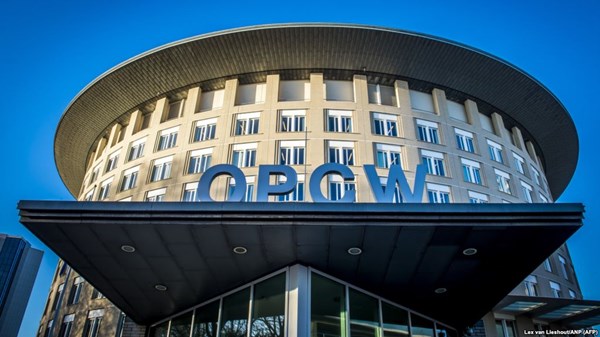Russia’s initiative for joint investigation of Skripal case rejected by OPCW
The Russian proposal (drawn up with China and Iran) to hold a joint British-Russian investigation in order to clarify the issues in the so-called Skripal case did not receive the necessary two-thirds majority (28 out of 41 votes) at the extraordinary session of the executive committee of the Organization for the Prohibition of Chemical Weapons (OPCW).
According to the British Foreign Ministry, out of the 41 members of the executive council, six voted in favor of Russia’s proposal, 15, including Britain, voted against it, 17 abstained from voting, two representatives were absent, and one representative was not eligible to vote.
British permanent envoy to the OPCW John Foggo explained that the Russian state is the primary suspect in the Salisbury attack, and so a joint investigation between London and Moscow would be “perverse”.
Russia filed a request to convene an extraordinary session of the OPCW’s executive committee on March 29. The reason for the request was the poisoning of former GRU officer Sergei Skripal and his daughter Yulia on March 4 in Salisbury, England. The British government said that the assassination attempt is highly likely to have been organized by the Russian government, using a chemical weapon (a nerve paralysis agent) from the Novichok group.
According to Twitter posts by the Russian embassy to the Netherlands, Moscow’s proposal was already supported by 14 of the 41 council members. In addition to Russia, Iran and China, who drafted the resolution, it was supposedly supported by seven former Soviet republics (Azerbaijan, Armenia, Belarus, Kazakhstan, Kirghizia, Tajikistan and Uzbekistan), three of Russia’s allies in Latin America (Venezuela, Cuba and Nicaragua), as well as Pakistan and Syria.
However, only six countries actually voted in favor of Russia’s proposal, Reuters reports: Russia, Iran, China, Azerbaijan, Sudan and Algeria; 15 countries voted against it and a further 17 abstained from voting.
Although Bulgaria is not in OPCW’s current executive committee, Bulgarian representative Krassimir Kostov made a statement on behalf of the EU (of which Bulgaria is the current chair). According to him, Russia refuses to provide the British with the requested information, is dodging its obligations as a signatory of the convention, and is actively undermining the OPCW’s authority in the media sphere. Representatives of several other EU states – Ireland, Estonia, Denmark and the Netherlands – expressed complete agreement with Kostov’s statement and the assessment that Russia is “highly likely” to be guilty of the attack in Salisbury.
The Swiss representatives maintained a special stance. Concurring with the statement on behalf of the EU, the Swiss delegation nevertheless emphasized that the taking of concrete measures on the level of the OPCW should wait for the conclusions drawn by the organization’s chemical weapons experts. “However, we recognize London’s right to choose its own response, and its right to an independent police investigation according to national legislation. This is one of the reasons why the proposal [put forward by Russia] is unacceptable to us,” Swiss representative Peter Lykke added.
Austrian permanent representative Gerhard Eisl did not mention Russia in his speech. According to him, although Vienna is in solidarity with the EU’s statements, it is still waiting for the experts’ final conclusion. Alongside Greece and Cyprus, Austria was one of the three EU countries that publicly refused to take any diplomatic measures against Moscow before a final clarification of the incident in Salisbury.
During the session, OPCW Director-General Ahmet Üzümcü promised that the organization’s chemical weapons experts would complete their analysis of the specimens of the toxic substance used in Salisbury by the start of next week. The group of OPCW experts began their work in Salisbury on March 19.
